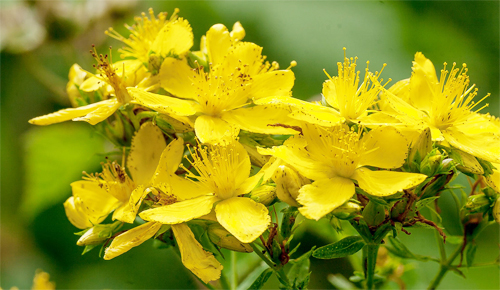The Top 15 Supplements and Vitamins for Stress Relief
Imagine going through the day with a constant happy vibe. You’re productive, content, and feeling good. In today’s busy world, we can so easily forget it’s possible to feel stress-free and live in a peaceful state of mind. Your stress levels don’t have to be through the roof. In fact, chronic stress can have serious ramifications on your health. Getting to that peaceful place may require lifestyle and dietary changes, but it’s definitely possible.

Being low on certain vitamins or minerals can actually lead to the feeling you know of as anxiety or stress. People who are missing essential nutrients in their diets are more likely to have mood disorders. Counteracting those deficiencies by taking daily supplements can help improve symptoms and get you on the right track.
Top Supplements and Vitamins for Stress
The following vitamins, minerals, and supplements are the best for countering daily stress and creating a positive, carefree mood.
Minerals
Minerals are compounds formed naturally in the Earth, some of which are essential for our health. A few minerals play a clear role in mental wellness and promoting a healthy response to stress.
Magnesium
This essential mineral increases your body’s production of GABA, a neurotransmitter that encourages relaxation and even sleep. If you’re low or deficient in magnesium — far too common in North America — it can directly cause low stress tolerance and agitation.
Magnesium is a mineral that you can find in foods like green leafy vegetables, nuts, and legumes. Lucky for you chocolate lovers, this comfort food is rich in magnesium! Choose dark chocolate with more than 70 percent cacao.
Zinc
The essential mineral zinc is integral to your immune system and brain. People with lower zinc levels are more prone to depression. When people took zinc daily for 10 weeks, they reported feeling a lifted mood and more positive feelings.
You’ll find zinc in hemp seeds, pumpkin seeds, lentils, black beans, oats, wild rice, quinoa, pecans, mushrooms, and spinach, to name a few.
Lithium Orotate
Lithium is an alkali metal that you need in trace amounts. Incredibly, studies have linked the presence of this nutrient in drinking water to happier states of mind and more peacefulness across entire neighborhoods. It positively affects your brain health, nervous system, mood, and immunity.
Lithium orotate is lithium bonded to orotic acid. This very small molecule is able to cross the blood-brain barrier as well as cell walls, making it readily available for brain health. Small servings can have very positive effects on your emotional well-being.
Vitamins
Vitamins are compounds that play a crucial role in many body processes. However, you must get them from dietary sources since your body does not make them. Below are the vitamins that affect the stress response.
Vitamin D
Most individuals in the United States are low in vitamin D — an essential nutrient. Vitamin D not only helps your body absorb calcium, but it’s also important for a happy mood. Since most people get their vitamin D from sunshine, you may not get enough, especially in the winter.
Lack of vitamin D can lead to depression and an increase in stress and anxiety. Light therapy or supplementation can help, as there are not too many vitamin D-rich foods. Global Healing Center’s Suntrex® D3 contains lichen-derived D3 — the most absorbable form of the vitamin.
Vitamin B Complex
One of the main benefits of taking a vitamin B complex supplement is its positive impact on mood and stress. A vitamin B complex supplement usually includes thiamine (B1), riboflavin (B2), niacin (B3), pyridoxine (B6), folic acid or folate (B9), and cobalamin (B12).
A lack of B12, in particular, is linked to low mood and high stress. Men who took a B complex supplement along with vitamin C for around a month reported that their mental health was better, and they had less stress. In another case, men and women taking a vitamin B complex reported improvements in their mood and stress. That’s good news!
Herbs
Several herbs, which you can find in capsules, extracts, or tea, can help lift mood and reduce daily stress. Below are the best of the best!
Ashwagandha

Ashwagandha (Withania somnifera) is a popular herb in Indian culture. This plant has a positive impact on stress, anxiety, and memory. When people took ashwagandha for two months, it reduced levels of cortisol — the stress hormone — in their blood. Cortisol increases when you’re under pressure and affects your memory, immune system, weight, and more. Researchers also noted that ashwagandha didn’t cause any serious side effects.
Valerian Root
Valerian root (Valeriana officinalis) is an herb that has a calming effect on the body by supporting healthy levels of the neurotransmitter GABA. It lowers nervous tension and reduces anxiety and daily stress, as well. Ancient Greeks used this herb to improve sleep, and today it’s still popular among people who experience trouble sleeping. In fact, it’s the most commonly used sleeping aid in Europe. So if you do take valerian for stress, you may want to take it later in the day to avoid daytime drowsiness.
Tulsi (Holy Basil)
Holy basil or tulsi (Ocimum sanctum) has a lovely, spice-like taste and aroma that resembles nutmeg. Tulsi is an adaptogen, which means it helps the body adapt or adjust to stress. It’s popular in teas as well as nutritional supplements. As a supplement, it has been shown to help improve mood and daily stress and anxiety.
Ginseng
Korean or red ginseng (Panax ginseng) is an incredible herb with health-giving properties. In fact, Panax means “cure-all” in Greek. It can boost energy, reduce fatigue, increase alertness, lower stress, and lift mood. It’s known as a nootropic or brain booster, as well as an adaptogen. Korean ginseng also has powerful antioxidant activity that may reduce oxidative stress and protect brain cells.
Rhodiola
Rhodiola rosea is a flowering plant that grows in cold climates. People typically use it for anxiety, headaches, depression, and stress. Rhodiola is an adaptogen that normalizes body processes and hormones. When a group of people who had anxiety, stress, and other mood issues took Rhodiola, they experienced less anxiety, stress, anger, depression, and confusion.
Bacopa
Bacopa (Bacopa monnieri) is an Indian herb with small white flowers. For centuries, people have used Bacopa to improve memory and lessen stress. In recent times, when a group of people took this herb for 12 weeks, they felt less depressed and anxious. As a bonus, they also did better on a memory test. It’s thought that Bacopa helps regulate stress hormones.
St. John’s Wort

St. John’s wort (Hypericum perforatum) is a flowering plant that is popular in teas and supplements. People often dry and prepare its yellow flowers to help depression, anxiety, and other mood disorders. Today, it’s easy to find St. John’s wort in supplement form. It may help you better manage stress.
Other Supplements
Some supplements don’t fall cleanly into the categories of mineral, vitamin, or herbal supplement. However, they have an important and positive effect on health — in this case, brain health and the stress response.
L-Theanine
L-theanine is an amino acid naturally found in green tea leaves. As a supplement, you can buy it in a powder or pill form — or you can just drink green tea. L-theanine helps people manage stress and feel calm. People taking L-theanine may have lower cortisol levels, less stress, and less anxiety. This amino acid promotes relaxation without causing drowsiness.
Omega-3 Fatty Acids
Omega-3 fatty acids are a type of essential fat that your body needs. Since the brain is composed mainly of fat, it makes sense that they play an important role in cognitive function and the brain’s response to stress. When people with anxiety took omega-3 fatty acid supplements, they reported feeling more calm and less stressed.
You can find these fatty acids in nuts, seeds and plant oils. We recommend plant-based options, like flaxseed oil, olive oil, and algae oil for best results.
Probiotics
Probiotics are microorganisms that help balance gut bacteria inside your body. The gut plays a crucial and often underappreciated role in mental health, including how much stress you feel.
The gut makes most of the body’s serotonin, a neurotransmitter that contributes to happiness and well-being. Probiotic bacteria actually help produce the serotonin used by your body. They live symbiotically within our bodies, and we need a healthy gut microbiota for mental wellness. An advanced probiotic blend like Floratrex™ that has 25 unique strains and 75 billion CFUs provides well-rounded support for your gut and mind. You can also find probiotics in fermented foods like kimchi, kombucha, sauerkraut, and non-dairy yogurt.
Other Tips for Managing Stress
Taking herbs and vitamins isn’t the only way to manage stress. From getting a good night’s sleep to meditating more often, there are simple modifications you can make to feel better. The bottom line is that you should find what is really at the root of your stress and take action to reduce it. Experiencing stress over the long term can have detrimental impacts on various aspects of your health, so take it seriously. Here are a few ideas:
– Go for a walk outdoors
– Get more exercise
– Try deep-breathing exercises
– Meditate at least 10 minutes per day
– Get adequate sleep
– Create a gratitude journal
– Avoid completely caffeine, alcohol, and nicotine
– Talk to a counselor
If you’re not able to manage stress on your own, and it’s affecting your ability to enjoy life, please reach out to a licensed therapist to get additional help.
Points to Remember
When you’re feeling stressed, certain supplements and vitamins can provide a natural way to manage stress with few side effects. Improving the nutritional content of your diet is the first option, but where your diet falls shorts, you can add in supplements.
Minerals that may help include magnesium, zinc, and lithium, preferably lithium orotate. Vitamins include the D and the B-complex, particularly B12, and other supplements that don’t fit into neat categories, include probiotics, omega-3 fatty acids, and L-theanine. Herbs that can play a positive role in your response to stress include ashwagandha, valerian root, Korean ginseng, Rhodiola, Bacopa, and St. John’s wort.
There is a strong link between your physical health and emotional health, so try exercise, walking outdoors in nature, meditation, or journaling to alleviate stress. Also, focus on eating a healthy diet and avoid caffeine, alcohol, and smoking.
Stress reduction is an essential part of taking care of your health. We all deserve to live happy lives. You are worth it!
yogaesoteric
June 30, 2020
